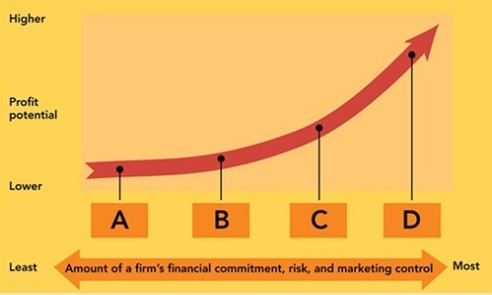A) economic infrastructure.
B) stock market performance.
C) trade regulations.
D) cultural diversity.
E) currency exchange rates.
G) A) and B)
Correct Answer

verified
Correct Answer
verified
Multiple Choice
A trade war is initiated when
A) the World Trade Organization issues fines to two or more corporations in a country.
B) two or more companies attempt to undercut one another's pricing strategy.
C) a country begins to accept imports for a new product category or class.
D) a country reduces tariffs for a particular product category or class.
E) countries attempt to damage each other's trade with excessive tariffs and quotas.
G) A) and D)
Correct Answer

verified
Correct Answer
verified
Multiple Choice
Licensing refers to
A) offering the right to a trademark, patent, trade secret, or similarly valued items of intellectual property in return for a royalty or fee.
B) contracting with a foreign firm to manufacture products according to certain specifications.
C) a foreign country and a local firm investing together to create a local business.
D) having a company handle its own exports directly without intermediaries.
E) exporting through an intermediary, which often has the knowledge and means to succeed in selling a firm's product abroad.
G) A) and C)
Correct Answer

verified
Correct Answer
verified
Multiple Choice
All of the following are challenges faced by Amazon in its expansion into India except which?
A) Low rates of credit and debit card usage among Indian consumers, and many without bank accounts
B) Well-financed and capable domestic competitors in India
C) Political instability and social unrest in India
D) Underdeveloped technology requiring financial and technological investment in a localized cloud computing platform for India
E) Strict trade regulations that prevent direct sales to Indian consumers
G) A) and E)
Correct Answer

verified
Correct Answer
verified
Multiple Choice
Economic infrastructure is
A) a nation's military-industrial complex.
B) a country's governmental services.
C) the people and the wealth of a nation.
D) a country's communications, transportation, financial, and distribution systems.
E) all of a country's natural resources, whether or not they are currently being exploited.
G) A) and C)
Correct Answer

verified
Correct Answer
verified
Multiple Choice
Select Service Partner (SSP) Group has operations in 30 countries involving food and beverage establishments, often in transit hubs such as airports and railway stations. SSP also operates Starbucks locations in airports in Finland, Sweden, and Norway. SSP pays Starbucks a royalty based on sales, as well as a fee for each store. In these instances, Starbucks is engaged in
A) direct exporting.
B) indirect exporting.
C) contract manufacturing.
D) foreign assembly.
E) franchising.
G) A) and D)
Correct Answer

verified
Correct Answer
verified
Multiple Choice
The practice where a translated word or phrase is retranslated into the original language by a different interpreter to catch errors is referred to as
A) locution.
B) heuristics.
C) transliteration.
D) back translation.
E) cross-cultural paraphrasing.
G) B) and C)
Correct Answer

verified
Correct Answer
verified
Multiple Choice
The law, as amended by the International Anti-Dumping and Fair Competition Act, that makes it a crime for U.S. corporations to bribe an official of a foreign government or political party to obtain or retain business in a foreign country, is referred to as the
A) International Law for Egalitarian Ethics Act.
B) International Fair Practices Act.
C) Law of International Equity Act.
D) International Law of Ethical Business Practices Act.
E) Foreign Corrupt Practices Act.
G) D) and E)
Correct Answer

verified
Correct Answer
verified
Multiple Choice
A disadvantage of a joint venture arrangement when entering a new global market is that
A) intermediaries have the potential to harm the brand.
B) the firm entering the foreign market must pay royalties to the other firm.
C) one of the companies forgoes control over its product.
D) the two companies may disagree about policies.
E) this method is likely to provide the fewest subsidies from the host country's government.
G) A) and C)
Correct Answer

verified
Correct Answer
verified
Multiple Choice
 Figure 6-4
-According to Figure 6-4, point A would most likely represent what option for entering the global marketplace?
Figure 6-4
-According to Figure 6-4, point A would most likely represent what option for entering the global marketplace?
A) joint venture
B) licensing
C) exporting
D) direct investment
E) franchise
G) All of the above
Correct Answer

verified
Correct Answer
verified
Showing 241 - 250 of 250
Related Exams